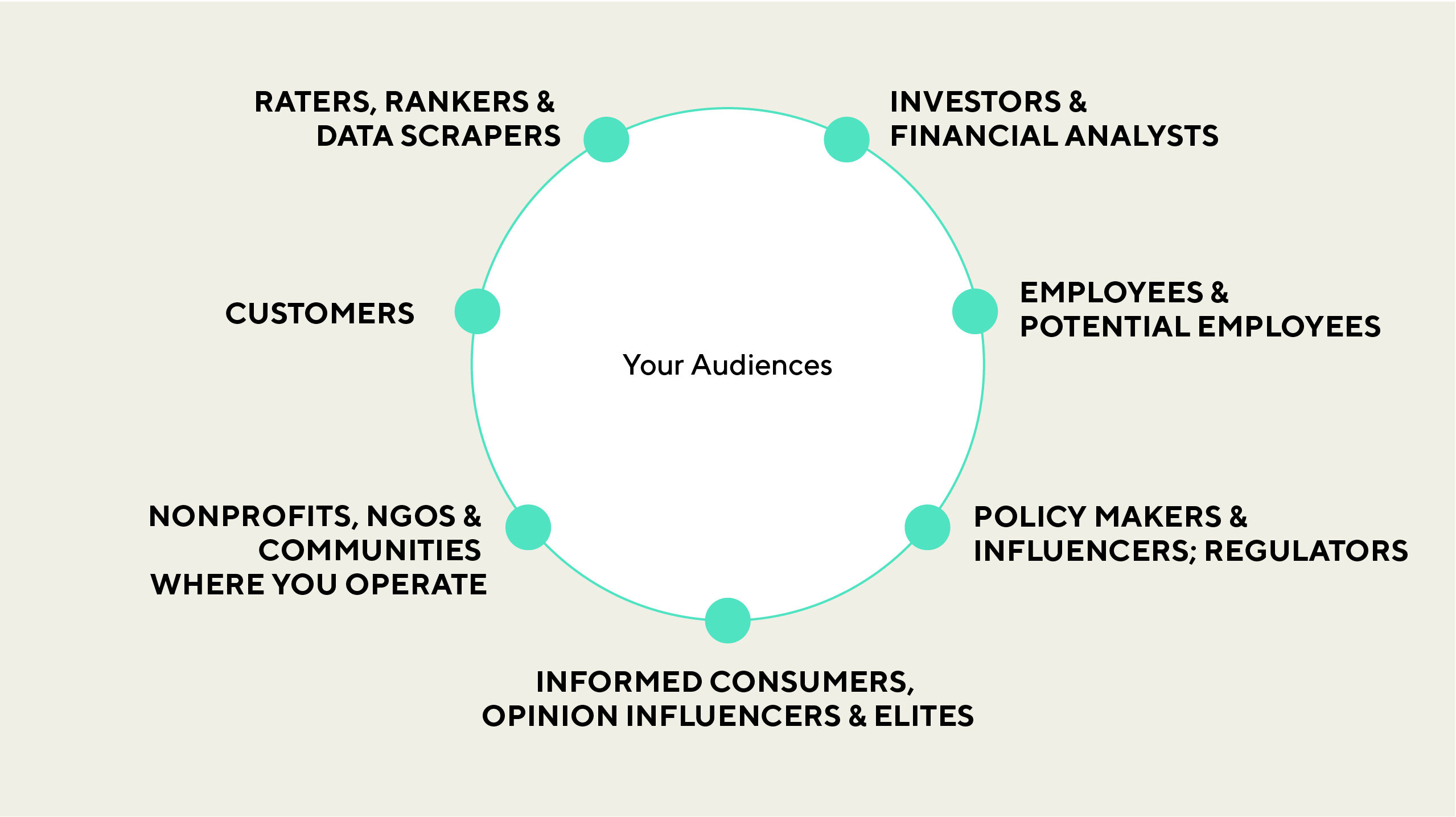Who are the 7 Key Audiences for your Sustainability Report?
Creating a corporate sustainability report is a lot of work! More stakeholders are asking for more information on more topics. But who is looking for this information, and why?
We’ve identified a constellation of seven key audiences who represent broad interests in your sustainability report. Even if the SEC mandates inclusion of some issues in the 10-K, that document can be reader hostile. There is a wide spectrum of interest depth and knowledge, but the things they have in common are clear:
- They care about your company
- They amplify your content
- They influence your reputation
- They give you license to operate
- They feed your growth or limit your options
So, who are they?

1. Investors & Financial Analysts
Investors and Financial Analysts see the company through the lens of financial performance, and the risks to that performance. They are interested in understanding how your company is managing its environmental, social, and governance risks and how it is capitalizing on the opportunities. For this audience, demonstrate that sustainability/ESG is embedded in your business and not an “add on.” ESG and earnings go hand in hand, and investment in these issues now ensures better positioning in the future marketplace.
2. Employees & Potential Employees
Employees are your biggest advocates and force for change as your company navigates challenges and creates its future state. They’re interested in understanding how their company is addressing sustainability/ESG issues and how they can contribute to these efforts. Showing progress can help engage employees and build a culture of sustainability within the company. Job seekers are looking at what kind of corporate citizen you are and including this information in their decision-making process.
3. Policy Makers & Influencers as well as Regulators
These are local and national political leaders, and whether they are in front of a crowd or online, they can affect change through advocacy, campaigning, and legislative efforts. Regulators result from policy and ensure your company is complying with environmental and social rules. Your report can demonstrate compliance with these regulations and a commitment to all the aspects of ESG. Sharing your actions builds trust with this audience and can facilitate a positive outcome: working with you to address issues that affect their communities.
4. Informed Consumers, Opinion Influencers & Elites
These are the thought leaders and innovators in your field and in the world who have a strong influence on public narrative. They could even be considered at the center of a stakeholder ecosystem based on their ability to be the tipping point for reputation. IBM reported that the pandemic changed people’s perspectives on environmental sustainability, with 2 in 3 saying these issues are significantly (very or extremely) important to them personally. While consumers may or may not be your direct customers, informed consumers are digging into supply chains and want to know that your company is doing its part; it’s affecting how they invest, job search, and spend.
5. Nonprofits, NGOs & Communities Where you Operate
These groups are interested in understanding how your company’s operations impact them and their world. You may partner with organizations to give back, build trust and establish a presence in the community, and organizations are increasingly looking at their own impact. Your sustainability/ESG report can build your credibility by demonstrating your commitment to sustainability and social responsibility though real-world examples. You can create a virtuous circle if you include examples and endorsements from this group.
6. Customers
Customers are increasingly interested in the sustainability and social responsibility record of the companies they do business with. As more companies look deep into supply chains, all companies are being pressured to account for their performance in key ESG areas, even those not subject to SEC reporting. Your report highlights your commitment to sustainability and social responsibility, and tracks year over year progress that ultimately builds trust and credibility.
7. Raters, Rankers & Data Scrapers
Typically driven by surveys, AI and automated processes, many third-party evaluators want to be given information they can process with little to no human intervention. Although we do not recommend catering exclusively to this crowded field, presenting key information in easily accessible formats in your report ensures your company is given credit for the work it is doing.
The Takeaway…
A well-designed sustainability/ESG report can help to build trust with your audiences by demonstrating your commitment to sustainability and social responsibility, ultimately contributing to your company’s long-term success. And, when you leverage the content created among other channels and communications, you can increase the reach and resonance of the messages. Now is a great time to get started!
How Ideas On Purpose Can Help
For over 20 years, IOP has been helping companies of all sizes with their purpose-driven communications, including corporate reporting and ESG storytelling. Our strategy, content, digital and creative teams are ready to help you define and tell your Sustainability/ESG story and meet your reporting goals. Feel free to email us, we’re happy to discuss the possibilities.
Photo: Photo by Alexandra Tran